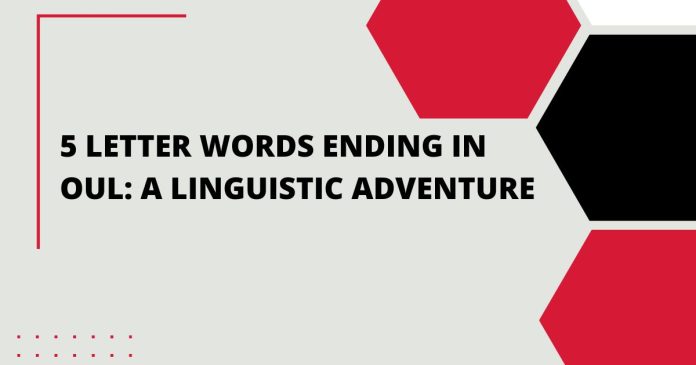In the vast realm of the English language, words come in all shapes and sizes, each with its own unique charm. Today, we embark on a linguistic journey to explore a specific category of words – five-letter words that culminate with the enigmatic “oul.” From soulful to joyful, this article will unravel the beauty and versatility of these words. So, let’s dive into the world of “5 letter words ending in oul.”
The Enigmatic “oul” Suffix
Before we delve into the captivating words themselves, it’s essential to understand the significance of the “oul” suffix. This suffix carries a sense of completeness or wholeness. It often adds a touch of emotion or intensity to the base word, making it an intriguing element of English vocabulary.
Soul – The Essence of Existence
The first word that comes to mind when we think of “oul” is undoubtedly “soul.” This three-letter powerhouse carries profound significance in various cultures and philosophies worldwide. It embodies the very essence of human existence, encompassing one’s thoughts, emotions, and consciousness.
Foul – A Tinge of Impurity
On the flip side, we have the word “foul.” This four-letter word packs a punch of negativity, signifying impurity or unpleasantness. Whether it’s foul weather or foul play, this word portrays a sense of discomfort.
Poul – Feathered Companions
Moving on to a lighter note, “poul” brings to mind our feathered friends – poultry. These birds provide us with a source of sustenance and are a significant part of various cuisines worldwide.
Ghoul – The Supernatural Intrigue
Venturing into the realm of the supernatural, we encounter “ghoul.” This mysterious five-letter word is often associated with malevolent spirits or creatures that feed on the flesh of the dead. It’s a word that has haunted our imaginations for centuries.
Haul – The Weighty Task
When you have a considerable load to transport, you might need to “haul” it. This action-packed word reflects the effort and strength required to move heavy objects from one place to another.
Droul – The Drowsy Drift
On a lazy Sunday afternoon, you might find yourself in a state of “droul,” half-awake and half-asleep, drifting in and out of consciousness.
Exploring More “oul” Words
Now that we’ve highlighted a few intriguing examples let’s broaden our horizons and explore additional five-letter words ending in “oul.”
Voul – The Voluntary Act
“Voul” represents something done voluntarily or willingly. It carries a sense of choice and freedom, making it a positive addition to our list.
Stoul – A Sturdy Foundation
“Stoul” might not be a common word, but it signifies a strong and sturdy foundation. It’s a term often used in construction and architecture.
Spoul – The Spontaneous Burst
Imagine a sudden burst of laughter or enthusiasm. That’s when “spoul” comes into play, representing a spontaneous and uncontrollable reaction.
Conclusion
In the tapestry of the English language, five-letter words ending in “oul” add both depth and diversity. From the profound depths of the soul to the mysterious allure of ghouls, these words offer a rich and varied linguistic experience. Whether they evoke emotions, describe actions, or create vivid imagery, “oul” words continue to be a captivating part of our everyday communication.
Now, you’re armed with a unique understanding of these words, allowing you to appreciate their significance and use them more effectively in your own expressions.
5 Unique FAQs
Q1: Are there any more five-letter words ending in “oul”?
Absolutely! While we’ve explored a handful of them in this article, there are more “oul” words waiting to be discovered in the English language.
Q2: Can I use these words in everyday conversations?
Certainly! These words are part of the English lexicon, and you can use them to add flair and variety to your speech and writing.
Q3: Are there any longer words with “oul” endings?
Yes, there are longer words with “oul” endings, such as “disoulment” and “resoulution,” which are less common but intriguing nonetheless.
Q4: What’s the origin of the “oul” suffix?
The “oul” suffix has its roots in Middle English and Old French, where it was often used to indicate a sense of completeness or wholeness.
Q5: Can I create my own “oul” words?
Certainly! English is a dynamic language, and word formation is an ongoing process. Feel free to get creative and invent your own “oul” words if you wish.

